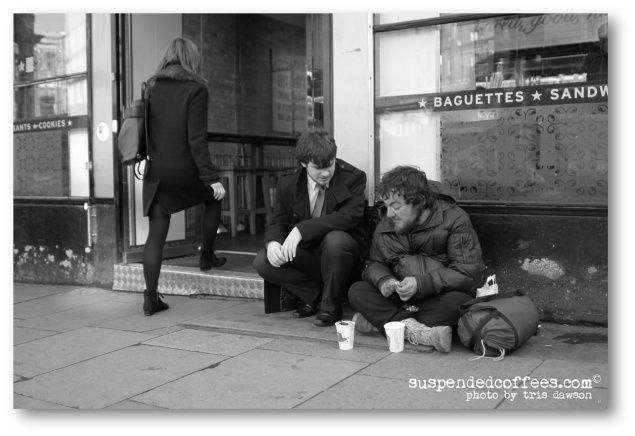What sort of person becomes homeless?
What does the word ‘home’ mean to you? Be it one room or a mansion, ‘home’ usually involves a roof over your head. Hopefully it is a place of safety. Perhaps you have the love of a partner, a family or you share your life with a much loved pet. Somewhere you can find some privacy, recharge and relax. Where you can enjoy the things most of us regard as essential, such as a bathroom and a place to sleep.
So what does being ‘homeless’ mean? Firstly, there is no roof over your head. There’s no place of safety. There is no privacy. You don’t have the luxury of being able to have a wash or a shower, or even of being able to go to the toilet when you need to. You carry your ‘home’ in a backpack or a selection of plastic bags. The weather can be your enemy, even your killer. You may be alone, or you may even be a mother and/or father with children. All too often people ignore you, won’t make eye contact and instead make judgements about how you come to be sitting on a pavement, scruffy, unkempt, unwashed and demoralised, begging for your very existence.
Some people become homeless due to family problems – domestic abuse, social care such as fostering coming to an end, young adults being thrown out of the parental home or the breakup of families. Some people who live on the streets are mentally ill, or have addiction problems. A shamefully huge percentage of people experiencing homelessness are ex-veterans; some suffering with PTSD and others whose families broke up when they returned from duty or left the forces. And the remainder? Well they’re folk just like you and me: studies in the UK and the US have found that millions of individuals and families are just one pay check away from losing their homes. There but for the grace of God.
US figures indicate that:
• Over half a million people are homeless;
• A quarter of people experiencing homelessness are children;
• Tens of thousands of veterans are homeless;
• Many people are homeless because they cannot afford to rent;
• There are fewer places for people in poverty to rent than ever before;
• In the last few years millions have had their homes repossessed;
• 1 in 5 homeless people suffers from untreated severe mental illness;
Some cities are making homelessness a crime.
The statistics may differ around the world, but not the situation itself.
Whilst there are some very good shelters, many others are simply not safe places. People experiencing homelessness tell of being attacked, having their shoes or belongings stolen, and bed bugs and body lice; they can be particularly dangerous for women and young people. Understandably, some would rather take their chances sleeping on the streets. Even then they are often attacked, beaten, tormented, and more. There are even cases where people have been set on fire by passing thugs because they don’t regard the person sleeping rough as a human being.
Each person is an individual, not part of some non-specific homogeneous mass. One of the most important things you can do for a person experiencing homelessness is notice them. One homeless gentleman told an interviewer that he would rather be acknowledged and blatantly rejected than simply ignored. Stop and chat, share a coffee if you can, let them know that you see them. If you have nothing else to give, just give a few minutes of your time.
Let’s all do whatever we can to increase awareness of the issues affecting people who are experiencing homelessness, and encourage our communities to help them, in big or small ways, every day. Even eye contact and a smile will go a long way.
